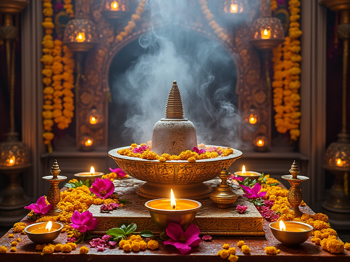-
Spiritual Cleansing: The Rudra Abhishek is considered highly powerful in cleansing the soul and environment. It purifies negative energies and brings peace, prosperity, and harmony into one’s life.
-
Divine Blessings: Performing these pujas is believed to invoke the divine blessings of Lord Shiva, ensuring protection, guidance, and support in all aspects of life.
-
Karmic Relief: The rituals are said to reduce the effects of bad karma and free the devotees from past sins, leading to a more balanced and positive life journey.
-
Fulfillment of Desires: Devotees perform these pujas with the belief that Lord Shiva, the benevolent one, grants wishes and fulfills desires, whether they pertain to health, wealth, or happiness.
-
Peace and Prosperity: The pujas are thought to bring mental peace and prosperity, removing obstacles and difficulties from the devotee's life.
-
Healing Powers: The Rudra Abhishek has a deep connection with the healing energies of Lord Shiva, known to cure diseases, improve health, and promote overall well-being.
- Removes negative energies and purifies the mind, body, and soul.
- Brings peace, prosperity, and harmony into the devotee’s life.
- Protects from negative influences and evil forces.
- Grants blessings for fulfilling desires, whether related to health, wealth, or personal issues.
- Aids in reducing the effects of bad karma and past sins.
- Enhances spiritual growth and provides a sense of inner peace and contentment.
- Promotes physical and mental health by invoking the healing energies of Lord Shiva.
- Ensures overall well-being and long-term success in various endeavors.
- Strengthens family bonds and relationships by bringing positivity and understanding.
- Provides protection from misfortunes and enhances the overall quality of life.
Step-by-Step Procedure for Rudra Abhishek and Parthiv Shivling Puja
Materials Required:
- Parthiv Shivling (a small, temporary Shivling made from clay or wheat flour)
- Water (in a Kalash or pot)
- Milk
- Honey
- Ghee
- Sugar
- Yogurt (Curd)
- Bilva (Bel) leaves
- Flowers (especially white flowers)
- Sandalwood paste
- Akshata (rice mixed with turmeric)
- Fruits and sweets
- Incense sticks
- Camphor
- Lamp (Diya)
- Sacred thread (Yajnopavit)
- Vibhuti (holy ash)
- Panchamrit (a mixture of milk, yogurt, ghee, honey, and sugar)
- Betel leaves and nuts
- Dakshina (money as offering)
- Holy texts for chanting Rudram (if available)
1. Preparation:
- Wake up early and take a bath, cleansing both body and mind.
- Wear clean clothes, preferably white or light-colored traditional attire.
- Clean the place where the puja is to be performed.
- Set up a small altar with the Parthiv Shivling in the center.
- Arrange all the puja materials neatly on a tray.
2. Purification (Achamanam and Sankalp):
- Sit facing east or north.
- Perform Achamanam (sipping water from the right palm after reciting specific mantras).
- Take a few drops of water in your right hand, and recite the Sankalpam (a vow to perform the puja with a specific intention or wish).
3. Invocation (Pran Pratishtha):
- Invoke Lord Shiva into the Parthiv Shivling by reciting the appropriate mantras, such as "Om Namah Shivaya" and offering flowers and Bilva leaves.
- Light the lamp and incense sticks.
- Place the sacred thread (Yajnopavit) on the Parthiv Shivling.
4. Rudra Abhishek:
- Water Abhishek: Start by pouring water over the Parthiv Shivling while chanting "Om Namah Shivaya" or Rudra mantras.
- Panchamrit Abhishek:
- Pour milk over the Shivling, followed by yogurt, ghee, honey, and sugar.
- Chant "Om Namah Shivaya" or specific Rudra mantras during each offering.
- Water Abhishek: Again, pour water over the Shivling to cleanse it after the Panchamrit.
- Sandalwood Paste: Apply sandalwood paste on the Shivling.
5. Offering (Naivedya and Flowers):
- Offer Bilva leaves, white flowers, Akshata, and fruits to Lord Shiva.
- Chant Shiva mantras or Rudram during the offering.
- Offer the prepared sweets or Naivedya.
6. Aarti and Mantra Recitation:
- Light the camphor and perform Aarti (a circular movement of the lamp) while chanting the Aarti song or "Om Jai Shiv Omkara."
- Recite the Rudra Namakam and Chamakam (if possible) or simply chant "Om Namah Shivaya."
7. Vibhuti Application and Prasad Distribution:
- Apply Vibhuti (holy ash) on your forehead and offer it to others present.
- Distribute the prasad (the fruits and sweets offered) among the participants.
8. Parthiv Shivling Visarjan:
- After completing the puja, the Parthiv Shivling is typically dissolved in a water body (such as a river or lake) as a symbolic gesture of returning the deity to its elemental form.
- If a natural water body is not accessible, you can dissolve it in a bucket of water and then pour the water under a tree.
9. Conclude the Puja:
- Offer Dakshina (charity) to the priest or to the poor, if applicable.
- Offer your final prayers, seeking forgiveness for any mistakes made during the puja.
This procedure can be adapted based on specific traditions or local customs. The most important aspects are devotion, sincerity, and proper chanting of mantras.




